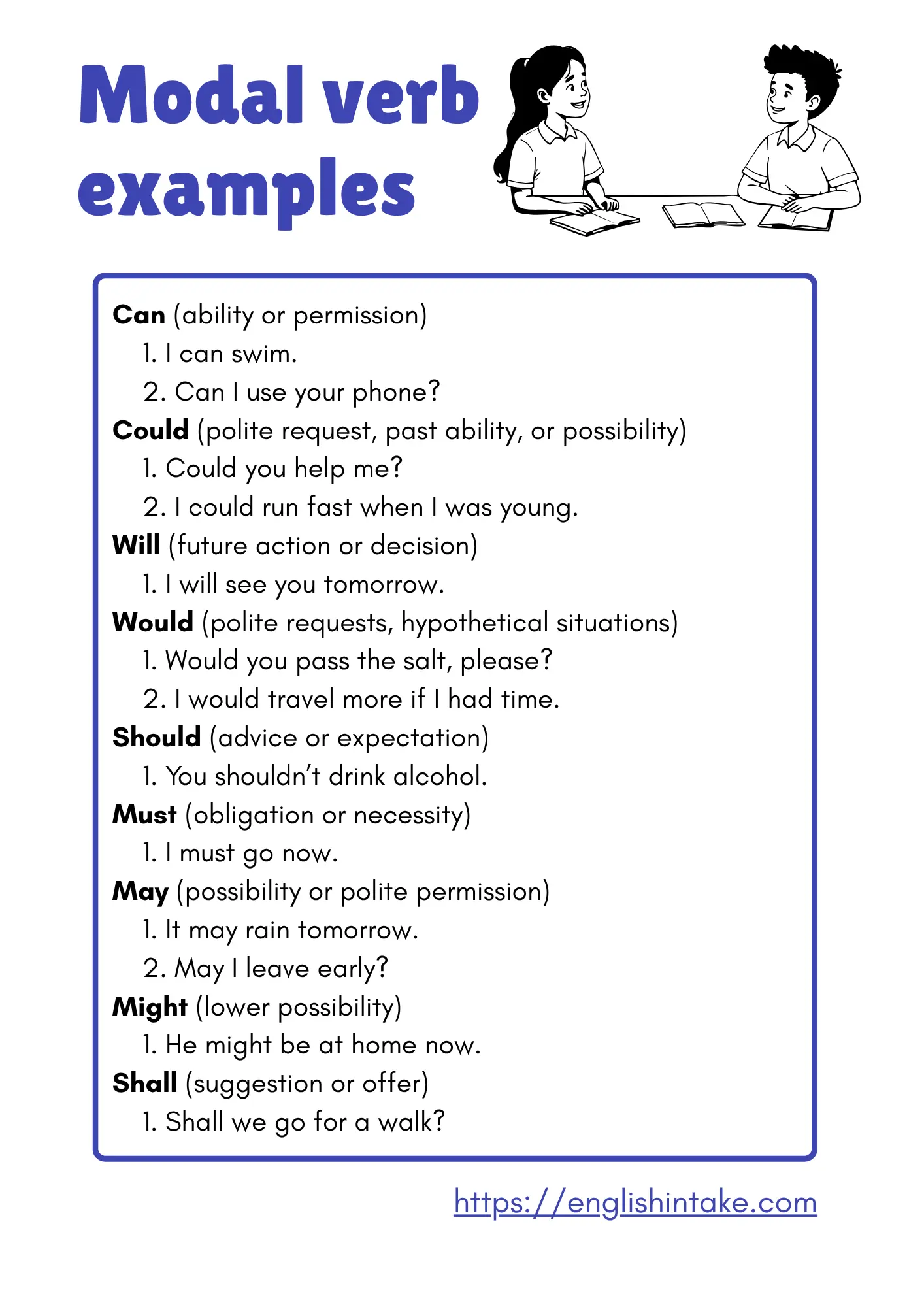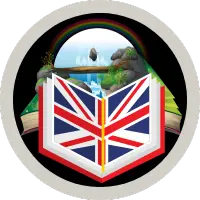1. Examples and use of modal verbs
We use modal verbs in many situations. The table below gives some examples of the cases where they are used.
| Usage | Modal verb | Example |
|---|---|---|
| Ability | can | I can play the guitar. |
| could | I could do a backflip when I was young. | |
| be able to | Have you been able to get some work done? | |
| Permission | can | Can I open the window? |
| could | Could I borrow your pen, please? | |
| be allowed to | You are not allowed to smoke here. | |
| may | You may use your mobile device now. | |
| Possibility | may | It may rain today. |
| might | I might go to his office today. | |
| could | I guess you could still repair your phone. | |
| Certainty | must | It’s too late now. She must be sleeping. |
| can’t | We can’t go out now. It’s too dangerous. | |
| Necessity | must | My tooth aches. I must see a dentist. |
| have to | It’s already half past one. I have to pick up my daughter now. | |
| Advice | should | You should see a doctor. |
| ought to | You ought to work harder. | |
| had better | You’d better break up with him. |

2. Modal verbs of ability
The modal verbs can, could, and be able to are used to express ability. We use can to say that it is possible for someone to do something or that something is possible.
● I can run 30 km non-stop.
● Do you think you can fix the car by noon?
● Can you play the piano?
● Can you go with us tomorrow?
● He can’t swim.
● He is sick. He can’t play with us today.
● There is nothing they can do to resolve the issue.
Could is the past form of can.
● I could run 30 km non-stop when I was young.
● We had to take a taxi. He couldn’t fix the car yesterday.
● He was sick. He couldn’t play with us yesterday.
● It was so foggy. I could not see the road clearly.
● There was nothing they could do to resolve the issue.
● I couldn’t find the shop you were talking about.
● There was so much noise. I couldn’t sleep well.
To be able to has a similar meaning as can but is a little more formal. To be able can be conjugated in all tenses.
● I was not able to answer all the exam questions.
● Were you able to answer all the exam questions?
● Will she be able to come with us tonight?
● The police hadn’t been able to arrest the suspect.
● I wish I was able to help her.
● He is able to speak five different languages.
● They haven’t been able to fix the car yet.
3. Permission
The modal verbs can, could, be allowed to, and may are used to talk about rules set by someone else.
| May | May I have your attention, please? |  |
More formal |
| Could | Could I speak with you for a moment, please? | Formal | |
| Can | Can I talk to you for a second? | Less formal |
May is the most formal form of all modal verbs. In the negative form, we do not contract may + not. Thus, it is wrong to say mayn’t.
● You may not use our platform for any illegal activities.
● May I use the bathroom, please?
● May I use your pen?
● You may stand up now.
● May we come in, please?
● Customers may use the parking at the front entrance while shopping with us.
● You may not take photos without permission.
Could is less formal than may, but is more formal than can. Could is also used to talk about permission in the past.
● Could I use the bathroom, please?
● You could go now if you want.
● Could you pass me the salt, please?
● Could you call me later, please?
● You could use my car tomorrow. I’m not going to use it.
● When we were teenagers, we couldn’t go out without our parent’s permission.
● In high school, we couldn’t use any electronic devices during class.
Can is used to talk about permission in a more casual way.
● Can I talk to you later?
● Can you come back later?
● Can I borrow your book?
● We can leave now.
● Can we meet tomorrow after lunch?
● Can I give her a candy?
● You can’t park here.
We can use be allowed to in all verb forms to talk about permission to do something. The other modal verbs are generally used to talk about permission in the present (can, may) and the past (could).
● Visitors are not allowed to take photos in the museum.
● Visitors will no longer be allowed to take photos in the museum.
● Students were not allowed to use any electronic devices during the exam.
● People were not allowed to buy any alcoholic drinks during the Covid-19 pandemic.
● Will he be allowed to go out with us tomorrow?
● I was allowed to take 10 days off after my wedding.
● My boss allowed me to leave early yesterday.
4. Expressing possibility
May, might and could express the possibility or the likelihood of something. They have similar meanings.
● It may rain tomorrow. (= Perhaps it will rain.)
● I might go to the beach tomorrow. (= Perhaps I will go to the beach tomorrow.)
● Be careful! It might be a venomous snake. It could strike at any moment.
● Bryan may not pass his driving test.
● She might lose her job.
● You could lose your job if you are not careful.
● We could win the lottery.
In some cases, could indicates only a small possibility. The likelihood or the probability of something to happen is small.
● I doubt he could help us. (=The possibility of him helping us is very small.)
● We could still catch the train if we leave now.
● We could win a million pounds. (=Perhaps we will win it but the chance is small.)
● Send us your best holiday photo and you could win a plane ticket to Paris.
● I don’t know where he is. He could be sleeping.
5. Indicating certainty
We use must when we are certain that something is true.
● I haven’t seen him for ages. He must have retired by now.
● He already fell asleep. He must be tired.
● A. Jane broke up with her boyfriend.
● B. Oh no, she must be sad and lonely.
● A. Have you seen my phone?
● B. No, but it must be around here somewhere.
● A. How long was your flight?
● B. Eleven hours.
● A. That’s a long flight. You must be tired now.
● He works at NASA. He must earn a decent salary.
● She is an astronaut. She must be smart.
We use can’t when we are sure that something is not true or that something is impossible.
● That can’t be right.
● He can’t be at home yet. (=You are certain that he is not at home yet.)
● She looks very young. She can’t be older than thirty.
● She has a strong accent. She can’t be a native speaker.
● His English sounds really good. He can’t be a beginner.
● John is unemployed. That can’t be his car.
● She looks too young to be married. That can’t be her husband.
6. Talking about necessity
We use must or have to to say that we need to do something.
● My exam is coming up. I have to study hard.
● My job interview is next week. I have to get ready for it.
● We have to leave now or we will miss our plane.
● My client needs this car tomorrow. I must fix it by the end of the day.
● Your injuries look bad. You must see a doctor.
● My mother is sick I must stay at home today to take care of her.
● You must hurry up or you will be late for school.
We don’t use must to express necessity in the past. Instead, we use the past form of have to.
● She was sick yesterday so she had to see a doctor. She was sick yesterday so she must see a doctor.
● It was raining so we had to stop our game.
● A fire alarm rang so we had to leave the office.
● Life was hard back then. I had to find another way to make more money.
● She was a single mother. Every day, she had to pick up her daughter from school.
● He was lost in the forest while camping. He had to find a way back home by himself.
● Did you have to pay anything to get your certificate?
● You didn’t have to pay me.
7. Giving advice
We use should, ought to, or had better when we want to express what is the best thing to do in a particular situation.
● You look tired. You should take some rest.
● Where should I put these books?
● You should talk to your parents about your feelings.
● He was very helpful. I ought to give him some tips.
● I think she is in a toxic relationship. She’d better break up with him before it’s too late.
● You’d better hurry up or you’ll miss your train.
● She’d better tell him the truth. He will find out sooner or later.
